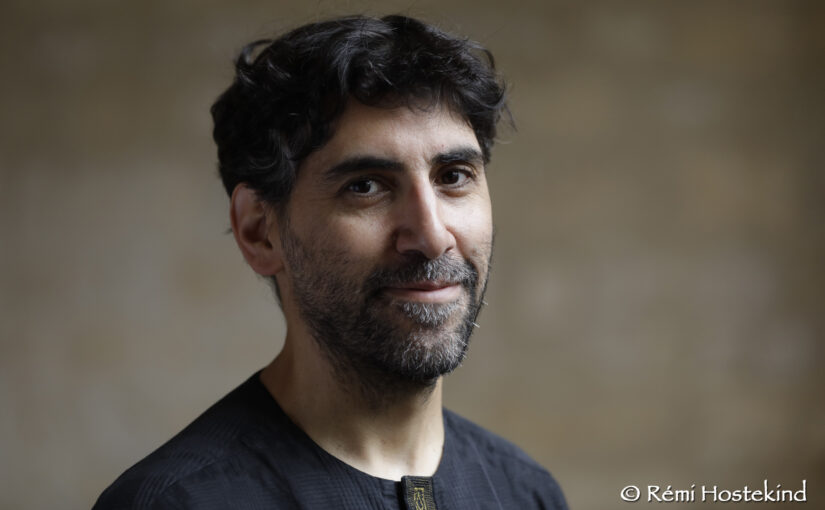Rhythms & improvisation in persian and indian modality
October 3 to 7, 2024
OBJECTIVES
This intensive musical practice course, in the form of a master-class, focuses on the analysis, creation and development of melodic-rhythmic phrases in Persian and Indian modality, using rhythmic forms and motifs from these musical traditions.
PEDAGOGICAL CONTENT
These rhythmic structures will be understood as keys to improvisation and composition.
• Understand and use the concept of ‘series’ where, while learning a series of rhythms, we learn together the technical elements and ideas for development that enable us to approach improvisation in a way that is both rational and intuitive, working on dynamics, accents, speed relationships, timbral interplay, ornamentation, etc., and of course maintaining great rigour in the metrics.
• Acquire a series of exercises enabling you to juggle different patterns in all metrics.
• Gain in freedom and pleasure, become independent, feel at ease in all meters (even, odd) and develop your own creative and artistic path.
• Memorise rhythmic developments and feel your way intuitively towards rhythmic and melodic modal improvisation.
• Understanding the forms of rhythmic development in the learned forms of Persian music and music from the Indian subcontinent (South India and North India), working on the ‘breaks’ at the end of the rhythmic cycle (the ‘ti-hais’, the ‘chakrodars’), the different mathematical forms of development (reductions, change of ratio, etc.).
• Develop sung rhythms in a fun, mnemonic way, as in bowls (North India) or konnokols (South India), or in a less formal way, as in Iran, where singing is a fun, direct way of grasping rhythmic forms.
• Find the right balance between relaxation and tonicity in the relationship between body and instrument.
CONDITIONS OF PARTICIPATION
Students are invited to take part with their musical instrument.
The competition is open to all singers, musicians, melodists and percussionists, from all musical cultures (classical, early music, jazz, world music, etc.) and at intermediate or advanced level.
REGISTER NOW
>> ON-LINE REGISTRATION <<
>> RATES AND REGISTRATION PROCEDURE <<
BIOGRAPHY
Keyvan Chemirani was born in Paris in 1968. Keyvan grew up in the hills of Manosque, in the Alpes de Haute Provence, where he immersed himself in Oriental and Mediterranean music. His father and teacher, Djamchid Chemirani, passed on traditional knowledge to him. It was Djamchid’s master, Ostad Hossein Tehérani, who turned the zarb from a simple accompanist into a soloist.
Until 1989, Keyvan Chemirani studied mathematics until he obtained his master’s degree and began an international career as a soloist and accompanist. Together with his father and master Djamchid and his brother Bijan, they formed the Chemirani Trio and performed all over the world. While drawing on Persian poetry, the Chemiranis compose and develop modern forms where the emphasis is on polyrhythms and the multiplicity of sounds; the trio reveals to its audience the infinite possibilities of Persian percussion.
His various musical encounters (flamenco, Ottoman, Greek, Arabo-Andalusian, Carnatic and jazz) have enabled him to grasp the particular characteristics of different traditions. The science of
Keyvan Chemirani has always been fascinated by the metrical science of India – from the North and even more so from the South – and has travelled extensively to understand the thinking behind Carnatic art music. Influenced both by Mediterranean modal music (from the Mediterranean basin to India) and by the great jazz musicians, he is trying to find a common language between these different musical cultures.
Thinking of Iranian percussion as a syntax that allows it to take on oral and written music from all over the world, and making it his own: this is the arduous and fascinating path that Keyvan Chemirani has taken, gradually transforming the Persian musical heritage he inherited from his father Djamchid Chemirani into multifaceted creations.
the Persian musical heritage he inherited from his father Djamchid Chemirani. That’s why, at the age of 53, he can in turn teach the legacy of the oral tradition, while keeping a contemporary outlook in mind.
SELECTIVE DISCOGRAPHY :
TRIO CHEMIRANI
1998 Trio de zarb, Al Sur, ALCD 241
2002 Qalam Kar, Iris Music, 3001 854
2004 Tchechmeh, Emouvance, emv 1019
2011 Trio Chemirani invite…, Accords-Croisés, AC 143
2015 Dawâr, Harmonia Mundi
TRIO CHEMIRANI & NEBA SOLO TRIO
2002 Falak, Cobalt, 09352-2
TRIO CHEMIRANI & ROSS DALY
« Blue Dragon » Live in Théatre de la Ville, Paris
KEYVAN CHEMIRANI
1997 Zarb duo, zarb solo, Al Sur, ALCD 231
2004 Le Rythme de la parole, Accords-Croisés, AC 104
2005 Le Rythme de la parole II, Accords-Croisés, AC 112.13
2007 Battements au coeur de l’Orient, Accords-Croisés, AC 121
2012 Melos, Accords-Croisés, AC 146
2014 Avaz, Innacor
2019 Keyvan Chemirani and the Rhythm Alchemy, Molpé production
2021 Hâl, ballades amoureuses, Alpha Classic
COLLABORATIONS
—- with baroque music —-
« Il diluvio universale » de Michelangelo Falvetti conducted by Leonardo Garcia Alarcon
—- with jazz music —-
Louis Sclavis « Silk and Salt melodies » ECM records
